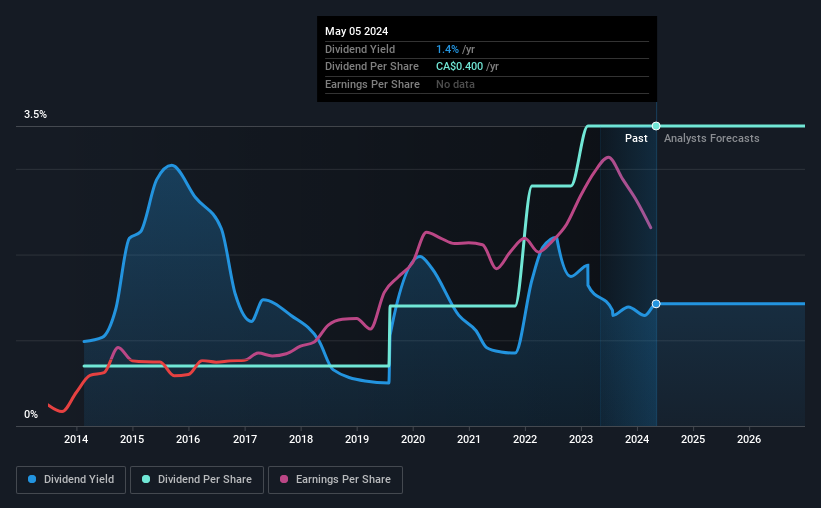- Canada
- /
- Energy Services
- /
- TSX:NOA
North American Construction Group (TSE:NOA) Has Announced A Dividend Of CA$0.10
North American Construction Group Ltd.'s (TSE:NOA) investors are due to receive a payment of CA$0.10 per share on 5th of July. The dividend yield is 1.4% based on this payment, which is a little bit low compared to the other companies in the industry.
View our latest analysis for North American Construction Group
North American Construction Group's Payment Has Solid Earnings Coverage
It would be nice for the yield to be higher, but we should also check if higher levels of dividend payment would be sustainable. However, North American Construction Group's earnings easily cover the dividend. This means that most of what the business earns is being used to help it grow.
The next year is set to see EPS grow by 150.7%. If the dividend continues along recent trends, we estimate the payout ratio will be 9.8%, which is in the range that makes us comfortable with the sustainability of the dividend.

North American Construction Group Has A Solid Track Record
The company has a sustained record of paying dividends with very little fluctuation. Since 2014, the annual payment back then was CA$0.08, compared to the most recent full-year payment of CA$0.40. This means that it has been growing its distributions at 17% per annum over that time. So, dividends have been growing pretty quickly, and even more impressively, they haven't experienced any notable falls during this period.
The Dividend Looks Likely To Grow
The company's investors will be pleased to have been receiving dividend income for some time. It's encouraging to see that North American Construction Group has been growing its earnings per share at 34% a year over the past five years. Earnings per share is growing at a solid clip, and the payout ratio is low which we think is an ideal combination in a dividend stock as the company can quite easily raise the dividend in the future.
We Really Like North American Construction Group's Dividend
Overall, we think that this is a great income investment, and we think that maintaining the dividend this year may have been a conservative choice. Distributions are quite easily covered by earnings, which are also being converted to cash flows. Taking this all into consideration, this looks like it could be a good dividend opportunity.
Investors generally tend to favour companies with a consistent, stable dividend policy as opposed to those operating an irregular one. Meanwhile, despite the importance of dividend payments, they are not the only factors our readers should know when assessing a company. Case in point: We've spotted 3 warning signs for North American Construction Group (of which 1 is significant!) you should know about. Looking for more high-yielding dividend ideas? Try our collection of strong dividend payers.
Valuation is complex, but we're here to simplify it.
Discover if North American Construction Group might be undervalued or overvalued with our detailed analysis, featuring fair value estimates, potential risks, dividends, insider trades, and its financial condition.
Access Free AnalysisHave feedback on this article? Concerned about the content? Get in touch with us directly. Alternatively, email editorial-team (at) simplywallst.com.
This article by Simply Wall St is general in nature. We provide commentary based on historical data and analyst forecasts only using an unbiased methodology and our articles are not intended to be financial advice. It does not constitute a recommendation to buy or sell any stock, and does not take account of your objectives, or your financial situation. We aim to bring you long-term focused analysis driven by fundamental data. Note that our analysis may not factor in the latest price-sensitive company announcements or qualitative material. Simply Wall St has no position in any stocks mentioned.
About TSX:NOA
North American Construction Group
Provides mining and heavy civil construction services to customers in the resource development and industrial construction sectors in Australia, Canada, and the United States.
Good value average dividend payer.
Similar Companies
Market Insights
Community Narratives


Recently Updated Narratives


The Quiet Giant That Became AI’s Power Grid


Nova Ljubljanska Banka d.d will expect a 11.2% revenue boost driving future growth


The AI Infrastructure Giant Grows Into Its Valuation
Popular Narratives


The company that turned a verb into a global necessity and basically runs the modern internet, digital ads, smartphones, maps, and AI.


MicroVision will explode future revenue by 380.37% with a vision towards success



